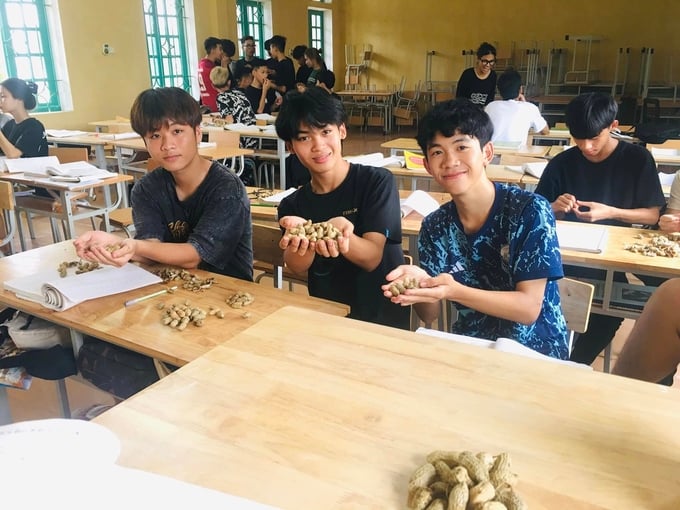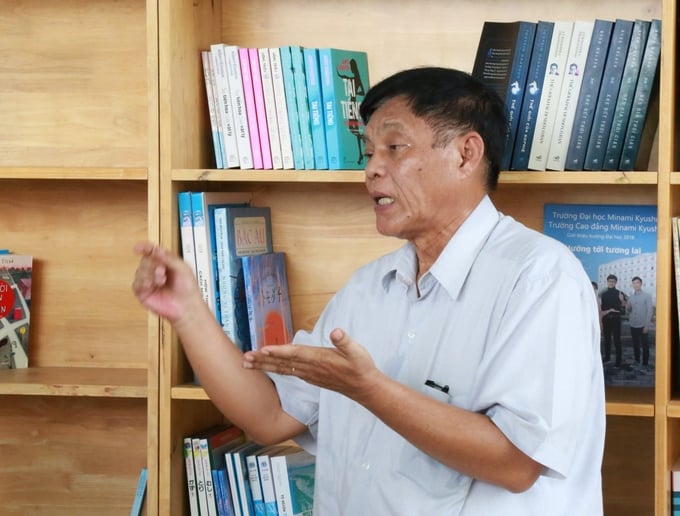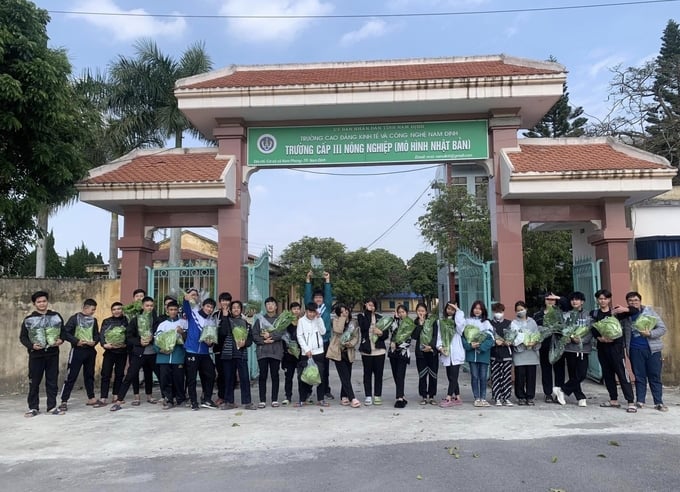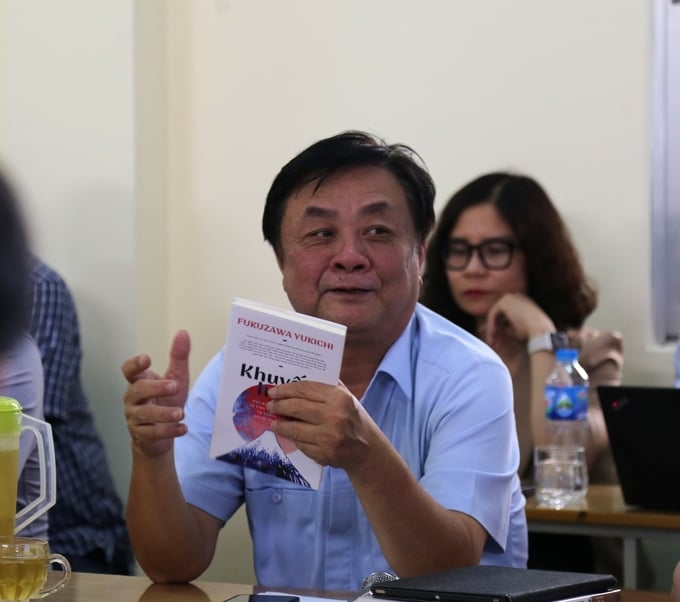May 21, 2025 | 03:53 GMT +7
May 21, 2025 | 03:53 GMT +7
Hotline: 0913.378.918
May 21, 2025 | 03:53 GMT +7
Hotline: 0913.378.918

Students at Nam Dinh Agriculture High School. Photo: Hoang Anh.
Recently in June, Minister of Agriculture and Rural Development Le Minh Hoan received a petition from the Agriculture, Forestry and Fishery Training Club (under the Association of Vietnam Universities and Colleges). A series of problems was delivered to the Minister. The petition mentioned that the agricultural industry has not been attractive to learners. Students are afraid of hard work and the risks of low income when studying agriculture. Training institutions have no supporting policy in training and human resource development. The schools still meet certain difficulties on the path of being autonomous…
Almost immediately, "the commander of the agricultural sector" presided over a seminar to dialogue with teachers and find solutions to remove difficulties. This happened in a quite special location, a simple room at Nam Dinh Agriculture High School - the first and only school to train students about agriculture following the Japanese model.

Dr. Pham Huu Loi - the "father" model of Nam Dinh Agricultural High School. Photo: Hoang Anh.
The school is founded in 2019, and its "father", Dr. Pham Huu Loi, is a man who has many years of living and working in the land of cherry blossoms, currently the director of the Japanese Language and Culture Center.
When we first arrived at the school, Dr. Loi and his students were reading at the library. He said that it was a daily activity after hours of studying, working, and playing together. As for the first impression, this school was tidy and clean. Although the facilities and infrastructure were more or less old, the campus has a study area, agricultural practice area, dormitory, playground, etc.
According to Dr. Loi, The philosophy of "learning to play, playing to learn" has been the school’s core value. Thanks to this mindset, the school had only started its enrollment in 2021 but currently has 134 students attending. The first course has 51 children, the second course increases to 83 children, and for the upcoming enrollment in September, the school expects to have more applications.
"We keep ‘whining’ about having fewer students studying agriculture, but have we ever gotten to the bottom of the reason?" is the question Dr. Loi asked Minister Le Minh Hoan and the teachers at the seminar. He added, “Agriculture or any field of study was the same, the first thing to convey to students is love, the love for nature, agriculture, starting from each piece of land to the trees around us. And where there is love, there is responsibility”.

Organic vegetable products of students from Nam Dinh Agricultural High School. Photo: Hoang Anh.
It is only the second course, but the whole residential area around the school has been placing orders for the vegetables of “Teacher Loi's student", and there are many other products to come, such as confectionery, pickled vegetables, kimchi, and peanut oil. Products from the learning process of "learning to play, playing to learn" of teachers and students are gradually commercializing. The school also teaches students about how to make attractive packaging designs and labels to sell directly to consumers.

Dr. Pham Huu Loi (right) presented Minister Le Minh Hoan with products the students made themselves. Photo: Hoang Anh.
According to the training scheme of Nam Dinh Agricultural High School, the Japanese model will last for 10 - 15 years. After graduation, students will come to Japan and work for 3 - 5 years at agricultural companies, food processing companies in the form of trainees.
After that, based on their preferences, students can continue to study for 4 years at Minami Kyushu School (Miyazaki Prefecture) under the association program. The goal of the school next year is to train 180 - 200 students per course, becoming a source of high quality technical labor forces for businesses in Japan and Japanese businesses operating business in Vietnam.
Minister Le Minh Hoan has recently chaired two major conferences in the North and the South which concern training and development of human resources for sustainable agricultural and rural development. Inspired by practical education models like the Nam Dinh Agricultural High School, the Ministry of Agriculture and Rural Development will coordinate with other ministries to submit to the Government and get permission to pilot the agricultural high school model in the training system under the Ministry.

Minister Le Minh Hoan said he would replicate the high school model in the training system of the Ministry of Agriculture and Rural Development. Photo: Hoang Anh.
The Ministry of Agriculture and Rural Development has also called on international organizations such as the Japan International Cooperation Agency (JICA) to support the replication of the agricultural high school model. The goal is to evoke and spread the love of agriculture to students from a young age.
As the earliest unit establishing high school among the schools under the Ministry of Agriculture and Rural Development, Dr. Pham Van Dien, Rector of Vietnam National University of Forestry, said, “Since 2017, Hanoi has decided to establish the Forestry High School. This is certainly a necessary strategy and direction to train human resources for the agricultural sector. There are approximately 1,500 applications submitted to the school this year, but the Forestry High School only recruits 500 students. It is still a very positive signal, showing the essentiality of replicating the agricultural high school model in training institutions".
Translated by Samuel Pham

(VAN) Japan's grant aid project contributes to capacity building, promoting organic agricultural production, and fostering sustainable community development in Dong Thap province.

(VAN) For years, the CRISPR-Cas9 genome technology has been reshaping genetic engineering, a precision tool to transform everything from agriculture to medicine.

(VAN) Vietnam aims to become a 'leader' in the region in the capacity and managing effectively soil health and crop nutrition.
![Reducing emissions from rice fields: [Part 1] Farming clean rice together](https://t.ex-cdn.com/nongnghiepmoitruong.vn/608w/files/news/2025/05/05/z6509661417740_a647202949c539012a959e841c03e1d3-nongnghiep-143611.jpg)
(VAN) Growing clean rice helps reduce environmental pollution while increasing income, allowing farmers to feel secure in production and remain committed to their fields for the long term.
/2025/05/19/5136-1-144800_230.jpg)
(VAN) The Nghe An Provincial People's Committee has just approved the list of beneficiaries eligible for revenue from the Emission Reductions Payment Agreement (ERPA) in the North Central region for the year 2025.

(VAN) 14 out of 35 domesticated elephants in Dak Lak province have had their living conditions improved, with 11 of them currently participating in the non-riding elephant tourism model.

(VAN) Muong Nhe Nature Reserve hopes that being upgraded to a national park will lay the foundation for forest protection efforts to be carried out in a systematic, modern, and sustainable manner.